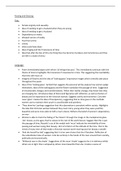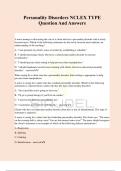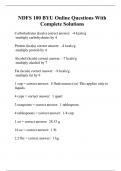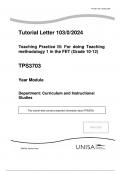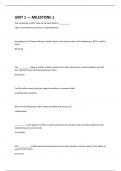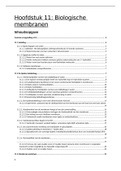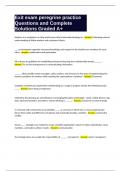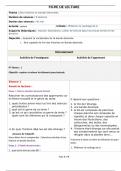Title:
• female virginity and sexuality
• Idea of needing to get a husband when they are young
• Idea of needing to get a husband
• Dependency on males
• Warped version of reality
• Past their prime
• Vanity
• what could have been
• Idea of aging and the Transcience of time
• Idea that after the loss of this one thing they live become mundane and monotonous and they
are left in a state of ennui
Language:
• Poem immediately begins with refrain ‘all things that pass’. This immediately continues with the
theme of time to highlights the transience if movements in time. This suggesting the inevitability
that time will move on
• Imagery of flowers and the idea of ‘looking glass’ importance images which centrally take place
throughout the poem
• Idea of the ‘looking-glass’. Symbol that suggests the personal will be analyse how women judge
themselves. Idea of the looking glass and the flower symbolize the passage of time. Suggestion
of innumerable changes and transformations. When their worlds change, they know that they
are changing too. Introduces ideas of literal and figurative self-reflection, as well as themes of
beauty and its importance to the Victorian woman. Suggests vanity and transience. Concrete
noun ‘glass’ creates the idea of transparency, suggesting that as time goes on the methods
women use to maintain their youth is unachievable and pointless.
• ‘They show her’ perhaps suggestion that this observation is prevalent within society. Highlights
the idea that Victorian women believed they must marry young when they were youthful,
beautiful and were more able to fulfil a man's desire. Reflects the belief of women's dependency
on men
• Woman is able to track the fading of ‘her bloom’ through the image in the metaphorical glass.
‘she’ knows, as she ages, that he values to the rest of the world lesson. Suggest that this is just
the passage of time, Rossetti's use of the modal verb ‘must’ indicate the inevitability of time
passing and women losing their beauty. Hint of criticism of the attitude of the time- that in the
minds of many men all that made a Victorian woman worth marring was her beauty a wealth
• ‘And she herself be laid’ suggesting that it is her own choice that she if forsaken. Reflection of
the subordinate tatus of women. Fate lies entirely in the hands of the men around them socially,
politically and economically.
• ‘Withered rose in the shade’. Suggestions of the noun ‘shade’ suggests she is in darkness whilst
others are in light. She is eclipsed by others more beautiful than she. Creates a sense of
, isolation. Highlights the vanity of society which leads to ennui for the women who is discarded
from society once they have aged due to societies focus on the next new beautiful women to
objectify for their own pleasure
• Symbol of the ‘withered rose and the fallen peach’. That which was once beautiful has become
externally transformed, and to the world, that is all that matters. Rose symbolises love and
passion. For a woman to be lay with ‘withered rose’ is a metaphor for lost love and love that was
never to be. Once a woman loses her beauty, she is cast aside. Alliteration in the ‘w’ and ‘the’
repeated emphasises the Transcience of beauty. Symbol of the ‘fallen peach’ links to the
prostitutes that Rossetti worked with as a volunteer for a rescue organisation. Perona
suggesting that a woman is no longer beautiful, she has as much chance of finding love as the
fallen women. Peaches have erotic connotations; here a euphemism for sexuality. Reference
compared to the symbolism ascribed to fruit in her long poem Goblin Market
• Intangibility created by Rossetti in the idea of ‘out of reach’. Highlighting the lack of control the
persona has in being loved as she is denied and rejected by a male counterpart.
• Rossetti metaphorically uses the ‘summer’ to suggest he Transcience of this moment in time.
The pleasure and beauty associated in this month will pass and degenerate. Idea of seasons
coming and going. Perhaps highlighting the fulfilment for the persona as she was loved by the
persona but in the decay of her beauty and her youth over time she has been discarded leaving
in a state of ennui.
• Rossetti begins with the refrain ‘all things that pass’. Impacts represented on women mental
and emotionally
• ‘Womans tiring glass’ suggestion that she has fallen out of popularity, and is used to refer a
dressing mirror. Potentially the horror of women in observing their own degeneracy of their
beauty of time and the stigma attached to this. Idea of the adverb ‘tiring’ could suggest the aged
nature of the women. It is this age that means she is discarded by society as her beauty and
appearance declined as time progressed and it unable to be resorted.
• ‘Faded lavender is sweet’ suggests that violets generally symbolise innocence and purity, no
though thus have passed for beyond their initial beauty. The dynamic verb ‘faded’ equally
following the degeneracy and depletion of female appearance and sexuality. Although the
adjective ‘sweet’ could suggests the personas optimistic spin on the situation. Suggests that this
allows them to become useful for other things rather than just being determined by their
appearance.
• ‘dead violet’. As a violet is a symbol of innocence it suggests that even an older woman can
retain her value and loveliness, even though her youthful innocence has passed. Gentle
rhythmic quality in the alliterative c and I. Colours of the flowers in the poem grow progressively
darked. Idea of preserved flowers symbolic of women's attempt to retain their beauty. Rossetti
is defeat in her defence of women as they age. This is reinforced by the exclamatory last line,
forms a dramatic climax.
• Brutal verb in ‘culled’ highlights the idea that they are picked out of society, dehumanized and
devalued as a result of their depleting looks. Yet, potentially this is criticised by the persona for
placing all the worth of society on looks rather than allowing women to reach their own levels of
intelligence.
• Symbols of flowers in innocent violets and the mature lavender plants. All emotion, no matter
which flower I is embodied in, end up ‘dried-up’. Contrary to societies long-held beliefs about

